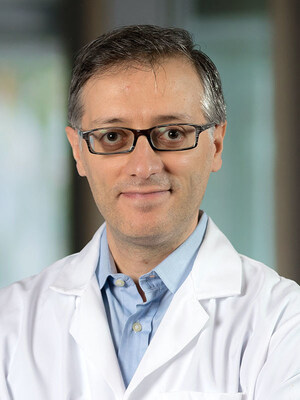Molecular Fingerprint Discovered that May Improve Outcomes for Head and Neck Cancer Patients
BRONX, N.Y., Jan. 23, 2012 /PRNewswire-USNewswire/ -- Researchers at Albert Einstein College of Medicine (http://www.einstein.yu.edu/) of Yeshiva University and Montefiore Medical Center (http://www.montefiore.org/), the University Hospital for Einstein, have found a biomarker in head and neck cancers that can predict whether a patient's tumor will be life threatening. The biomarker is considered particularly promising because it can detect the level of risk immediately following diagnosis. This discovery could become a component of a new test to guide how aggressively those with head and neck tumors should be treated. The findings were published online January 9 in the American Journal of Pathology.
"Previous efforts to identify biomarkers for guiding treatment of head and neck cancer have not developed anything clinically useful for patients," said Geoffrey Childs, Ph.D. (http://www.einstein.yu.edu/home/faculty/profile.asp?id=5512&k=&O=1), professor of pathology at Einstein and co-senior author of the paper.
Head and neck cancers (http://health.nih.gov/topic/HeadandNeckCancer), the sixth most common malignancy among men worldwide, most often affect the mouth, back of the throat and larynx (voice box). Smoking and alcohol use are major risk factors. Only half of patients are still alive more than five years after diagnosis—a survival rate that hasn't changed in 40 years.
In their study, researchers took tissue samples from tumors and nearby healthy tissue of 123 head and neck cancer patients at Montefiore and measured levels of 736 members of a class of RNA molecules known as microRNAs. Certain members of this family of RNAs, which regulate protein abundance in cells, are abnormally expressed in head and neck cancers as well as every other malignant cell type yet examined. Of all the microRNAs measured, one in particular – miR-375 – stood out for being the most down-regulated (i.e., expressed at low levels) in head and neck tumors compared with its levels in adjacent normal tissue.
The researchers ranked these 123 patients according to how extreme the difference was between the miR-375 in their tumor and in adjacent normal tissue, with that difference expressed as the ratio "miR-375 level in patient's tumor tissue divided by miR-375 level in patient's normal tissue." All patients were then followed throughout the course of their illness.
MiR-375 proved to be a highly useful biomarker for predicting disease outcome. The patients for whom the difference between their tumor and normal-tissue miR-375 levels was most extreme (i.e., the one-fourth of patients with the lowest ratios) were nearly 13 times more likely to die or 9 times more likely to experience distant spread (metastasis) of their cancer compared to patients with higher miR-375 ratios.
"As as a result of our study," Dr. Childs noted, "we hope that miR-375 will become part of a laboratory test to determine which patients have potentially lethal tumors and therefore should be treated aggressively following initial diagnosis. Our entire head and neck cancer group is working to identify and refine additional biomarkers to create a useful clinical test or 'personalized genetic signature' to help individual patients get the best possible treatment."
The title of the paper is "Low-Level Expression of miR-375 Correlates with Poor Outcome and Metastasis While Altering the Invasive Properties of Head and Neck Squamous Cell Carcinomas." Other Einstein-Montefiore researchers involved in the study were Jeffrey E. Segall, Ph.D.; Thomas M. Harris, Ph.D.; Lizandra Jimenez, M.S.; Nicole Kawachi, M.S.; Thomas J. Belbin, Ph.D.; Andrew Ramnauth, B.S.; Olivier D. Loudig, Ph.D.; Christian E. Keller, M.D.; Nicolas F. Schlecht, Ph.D.; and Michael B. Prystowsky, M.D., Ph.D. Surgery was carried out by co-author Richard V. Smith, M.D. and members of the head and neck surgery team. This research was supported by the National Cancer Institute, part of the National Institutes of Health.
Albert Einstein College of Medicine
Albert Einstein College of Medicine of Yeshiva University is one of the nation's premier centers for research, medical education and clinical investigation. In 2011, Einstein received nearly $170 million in awards from the NIH for major research centers at Einstein (http://www.aecom.yu.edu/home/nih.asp) in diabetes, cancer, liver disease, and AIDS, as well as other areas. Through its affiliation with Montefiore Medical Center, the University Hospital for Einstein, and six other hospital systems, the College of Medicine runs one of the largest post-graduate medical training programs in the United States, offering 155 residency programs to more than 2,200 physicians in training. For more information, please visit www.einstein.yu.edu and follow us on Twitter @EinsteinMed (http://www.twitter.com/EinsteinMed).
Montefiore Medical Center
As the University Hospital for Albert Einstein College of Medicine, Montefiore is a premier academic medical center nationally renowned for its clinical excellence, scientific discovery and commitment to its community. Montefiore is consistently recognized among the top hospitals nationally by U.S. News & World Report, and excels at educating tomorrow's healthcare professionals in superior clinical and humanistic care. Linked by advanced technology, Montefiore is a comprehensive and integrated health system that derives its inspiration for excellence from its patients and community. For more information, please visit www.montefiore.org and www.montekids.org and follow us on Twitter @MontefioreNews (http://www.twitter.com/MontefioreNews).
SOURCE Albert Einstein College of Medicine
WANT YOUR COMPANY'S NEWS FEATURED ON PRNEWSWIRE.COM?
Newsrooms &
Influencers
Digital Media
Outlets
Journalists
Opted In





Share this article